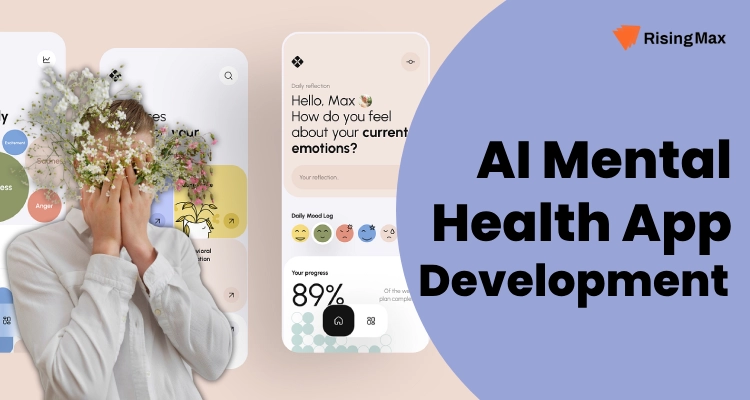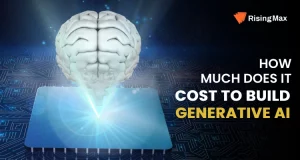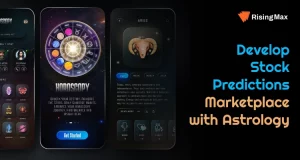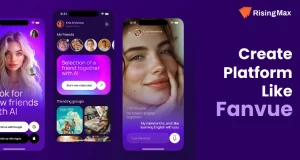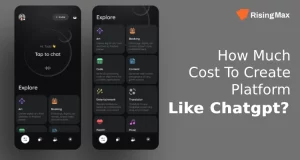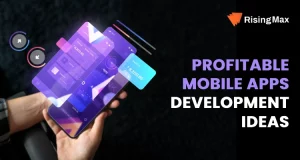Today’s busy lifestyle and pressuring workloads are the prime factors in developing mental health problems. Simultaneously, the healthcare industry is transforming with the rise in advanced technologies and digitalization.
According to reports, the global mental health app market is projected to grow from USD 5.72 billion in 2023 to USD 16.50 billion in 2030. Therefore, if you run a healthcare organization, AI mental Health app development is an excellent opportunity for you to revolutionize your services and lead ahead in the industry. It is an AI-powered solution that streamlines daily healthcare operations and helps provide patients with a positive treatment journey.
Top-Notch AI Mental Health App Development Company
RisingMax Inc. is a prominent AI mental health app development company with a team of dedicated developers to help you grow in the healthcare industry.
Why Invest in AI Mental Health App Development?
Developing an AI mental health app bridges the gap between patients and mental healthcare support. Below are compelling reasons to invest in these applications.
1. Streamlines Administrative Tasks
Medical staff usually must manage multiple tasks while providing excellent patient services, reducing operational efficiency. However, incorporating an AI mental health therapy app automates routine administrative tasks, enhancing staff productivity and business efficiency.
2. Enhanced Customer Engagement
There are some remote areas where medical facilities are less, but healthcare organizations can offer their services with AI mental health apps. It gives old or disabled patients easier access to medical treatments, especially in emergencies, enhancing their experience and increasing customer engagement.
3. Immersive Revenue Opportunities
There are multiple ways to monetize the AI Mental Health App, including in-app advertisements, subscriptions, or a freemium model. The app helps enterprises capitalize on a leading market and generate huge profits.
4. Positive Brand Reputation
The AI-powered mental Health app provides numerous features, such as personalized recommendations, real-time booking updates, and personalized assistance. These intuitive features make the treatment journey more straightforward and enjoyable, improving the user experience and brand reputation.
5. Cost-Effective
Running a healthcare organization requires a vast investment in administrative operations, such as paper tickets and manual data registration. However, an AI mental health app development can automate administrative tasks by providing an online appointment booking feature, making the mental health app a cost-effective option.
Intuitive Features of AI Mental Health App
AI Mental Health App Development has alluring features tailored to admin, doctor, and patient benefits. Check it out now!
For Admin
User Management:
The app uses RBAC (Role-Based Access Control), OAuth, and Single Sign-On (SSO) technologies to help the admin manage different users within the app with access controls.
AI modules Updates:
The admin can update and manage machine learning and AI models to monitor app performance and track errors, ensuring smooth operations.
Content Management System:
An integrated content management system like WordPress helps admin manage educational materials, blogs, videos, and other user resources.
Security and Compliance Management:
The app includes compliance frameworks like HIPAA, GDPR, and SOC 2, security measures, and SSL/TLS encryptions, ensuring patient data is compiled and secure.
Staff Workflow Management:
The integrated Google Analytics API tracks staff productivity and provides detailed reports to the admin, allowing them to manage workflow and delegate tasks.
Financial Management:
The AI mental health apps track every transaction and generate invoices, allowing the admin to manage bills and financial records within the app.
Medical Inventory Management:
The application keeps track of healthcare inventory and provides real-time updates to the admin when the stock is getting low and needs refilled.
For Patient
Appointment Booking:
The app’s user-centric design allows calendar synchronization, allowing patients to schedule real-time appointments with their preferred mental health professional.
Resource Management:
The app’s personalized algorithms analyze user profiles and previous data to deliver personalized mental health care resources.
Virtual Therapy Sessions:
The WebRTC, Twilio, and Agora tools help patients have real-time therapy sessions with licensed therapists through voice or video sessions.
Progress Tracking:
The patients can track their daily symptoms and mental health progress, like stress levels and mood changes, to motivate them.
Real-time Updates:
The AI mental health app uses push notifications to send patients real-time updates and messages about appointment reminders, session changes, and new resource availability.
Telemedicine Medication:
Patients can receive prescriptions and medication management services via telemedicine, including automated reminders for refills and dosages.
In-app Payments:
Integrating multiple payment gateways allows patients to securely pay for therapy sessions, subscriptions, or in-app resources.
For Doctors
Patient Registration and History Access:
The integrated HL7 and FHIR APIs help doctors register patients and access their medical records, including previous diagnoses, medications, and treatments.
EHR Integrations:
The doctors can easily integrate EHR systems with the application for seamless data exchange to eliminate data silos and enhance patient care.
Request Lab testings:
LabCorp and Quest Diagnostics APIs allow doctors to request lab tests for patients and track their results to improve patient care coordination.
How much does it cost to develop an AI mental health app?
Consult Rising Max Inc. for a detailed breakdown of developing a robust AI mental health app. Talk to experts now!
Advanced Integrations AI Mental Therapy App Supports
Below are the latest technologies we integrate into AI Mental Healthcare to enhance its functionality, streamline operations, and enhance the patient experience. Have a look!
1. IOT wearable Integrations
The AI mental health app can easily be integrated with IOT wearable devices like smartwatches or fitness trackers. These devices track patients’ health metrics, such as heart or breath rate, and provide actionable insights to help them make informed decisions.
2. EHR or EMR Integrations
The admin can easily integrate the AI-mental health application with EHR systems to efficiently manage patients’ medical histories, diagnoses, medications, and lab tests, providing personalized treatment and improving patient care.
3. IoMT
IoMT(the Internet of Medical Things) integration uses sensors and machine learning to monitor patients remotely, eliminating the need for human intervention and enabling faster and more precise diagnostics.
4. VR Technology
We integrate VR technology in AI mental health apps to create a sense of immersion during therapies or meditation, allowing users to experience complete emotions in a controlled environment. Additionally, VR can be used for medical education and rehabilitation training.
5. Natural Language Processing Models
Integration of Natural Language Processing models detects human emotions by analyzing voice notes or AI chatbots and provides them with empathetic responses to relieve their mental stress.
AI Mental Health App Development Steps
Following is the step-by-step procedure for AI-powered mental Therapy App Development; let us look at it.
1. Comprehensive Market Research
First, thorough market research is conducted to define the app’s purpose and identify the target audience to examine their requirements. Next, the strengths and weaknesses of the competitors are evaluated to analyze what your app must include to compete with them. Finally, an experienced mobile app development company is hired to help grow the market.
2. Define Features and Functionalities
Next, the development team consults with the healthcare organization’s admin and lists features they want to incorporate into their application.
3. Designing UI/UX
In this step, the creative designers design the app’s visually appealing interface with precise icon placement, consistent color schemes, and typography. They focus on delivering a smoother and trouble-free experience for users.
4. Tech Stack Selection and Development
This is one of the most crucial and sensitive steps: The team selects the correct and appropriate tech stack for developing an AI-powered mental Therapy App. They choose high-performance AI & ML models and programming languages to build smooth-running, efficient, and robust apps.
5. Testing and App Launching
Once the app is developed, the Q&A team tests each application element on different parameters to identify and fix any errors. Finally, the team deploys the app on dedicated servers for public use and collects user feedback for further improvements, if required.
Tech stack Required for AI mental health app development
Developing an AI-powered mental health app requires a combination of technologies across various domains to enhance its functionality. Below is an in-depth tech stack that we use for AI mental health app development.
| Type |
Tools/ Technologies |
| Front-End | React Native, Flutter, Swift, Kotlin/Java |
| Back-end | Node.js, Django, Flask, Ruby on Rails, Spring Boot |
| Database | PostgreSQL, MongoDB, Firebase (Realtime Database) |
| Authentication and Authorization | OAuth 2.0, Firebase Authentication, JWT (JSON Web Tokens) |
| AI & ML Integrations | TensorFlow, PyTorch, Scikit-learn |
| Real-Time Communication | WebRTC, Twilio, Daily.co ,Agora |
| Data Security and Compliance | GDPR, HIPAA, Okta, AWS IAM |
| Cloud Services | AWS, Google Cloud, Microsoft Azure |
| Analytics and Insights | Google Analytics, Mixpanel, Amplitude |
| Payment Gateway Integrations | Stripe, PayPal, Braintree, Razorpay |
Transform your Healthcare Business in Rising Max Inc.
Partner with Rising Max Inc. and build a futuristic mental health app to revolutionize your services and boost revenue.
AI-Powered Mental Therapy App Development: Cost Breakdown
The estimated cost of developing an AI-powered mental Therapy App ranges between $15,000 and $30,000. However, it is crucial to consider the factors below to get accurate prices.
1. Features and Functionalities
Features are the prime factors that describe the development cost of an AI Mental health app as it defines its functionality. A simple app with basic features like mood tracking has a lower development cost than one with advanced features such as personalized recommendations, AI chatbots, etc.
2. AI and ML models
Developing AI mental health apps for different healthcare organizations requires different models and algorithms, which need regular maintenance, increasing the overall development cost.
3. UI/UX Design
AI mental health app development cost also varies on its UI and UX design as it defines the user experience and engagement. Building an app with an intuitive interface, clear icon placement, and multiple animations has more development costs. However, developing an AI mental Health app with a simple design and minimal elements takes less investment.
4. Development and Customization
Customization is the only factor that takes maximum hours of development and costs. Building a highly efficient AI mental app with a strong tech stack requires more resources and development time, which increases its overall cost. Additionally, the cost of proficient AI mental health app development may be higher, but the results are worthwhile.
5. Integration with Existing Systems
Integrating the mental health application with existing EHR systems may require additional modifications to maintain interoperability, which could increase its overall development cost.
6. Launching Platform
The development team must fulfill different requirements and regulations for each launching platform. Developing an application for a single operating system costs less than for multiple systems.
7. Regulation Adherence
The AI mental health app must follow industry guidelines, such as HIPAA or GPPR, security measures, audits, etc., which costs extra money.
8. Updating and Maintenance
After deployment, the app needs proper maintenance, such as bug fixes and updates for future healthcare requirements, which upscale the development cost.
Different AI Mental Health App Development Solutions
We provide numerous AI mental Health app development solutions tailored to different requirements and benefits. Below are a few of them.
1. Cognitive Behaviour Therapy Solutions
These apps use CBT techniques to identify patients’ negative thought patterns and help them improve their mental health by providing self-guided exercises and through journals. It also provides AI chatbots to provide real-time support and monitor their emotional growth over time.
2. Addiction Recovery Therapy Apps
The mental health addiction recovery apps include tools like progress tracking, trigger management, and educational resources to help curb patients’ addictions. They also provide reliable communication channels, assisting users to connect with experienced counselors.
3. Anxiety Management Apps
Anxiety Management apps include features like breathing exercises and relaxing techniques to provide effective support to the user and help them calm their minds to reduce mental stress.
4. Meditation and Mindful apps
This app gives patients personalized programs, breathing exercises, and guided meditation sessions to reduce stress and achieve mental well-being. The admin can integrate VR technologies for immersive gamification and medication that helps improve user experience.
5. Counseling Therapy Mental health Apps
Therapy and counseling apps provide patients with mental health support by offering services like video sessions, live chats, or audio calls to connect with licensed therapists and counselors.
6. Mental Health Games Apps
The developers incorporate gamification techniques that provide an enjoyable approach for patients to reduce their stress and enhance their problem-solving capabilities.
Hire the Most Trustworthy AI mental Health app developers
Join hands with the reliable AI mental health app development company with dedicated developers with deep knowledge of AI, helping to lead ahead of competitors.
Monetization Strategies for AI Mental Health App
Below are a few effective strategies that help admin generate huge revenue from AI Mental Health App Development.
Freemium Model
The most common yet effective monetization strategy is the freemium model, in which the admin provides the application’s basic features for free but charges to access the premium or advanced features.
Content Monetization
In this revenue model, the administrator can monetize the content of the AI mental health app, such as high-quality videos, informative blogs, and articles created by highly qualified professionals. Users who wish to access these resources will need to pay, allowing the administrator to generate more revenue.
In-App Advertisement
As the name suggests, in the In-app advertising revenue model, the admin allows various brands to advertise their products and services within the app and charges them on a pay-per-click basis.
Subscription Model
Here, users have to buy subscription plans, whether monthly, half-yearly, or custom, to access certain features and services, helping admin generate immersive revenue.
Why Choose RisingMax Inc. for AI Mental Health Therapy App Development?
RisingMax Inc. is the leading AI Mental Health Therapy app development company with 13+ years of industrial experience. Our proficient designers, developers, and testers leverage the latest technologies to develop robust, industry-compliant mental health applications. We prioritize client satisfaction and build solutions that help them improve engagement and gain immense profits.
Frequently Asked Questions
Can I integrate the AI mental Health care application with third-party systems like EHR for customized use?
Yes. You can integrate our scalable AI-powered mental Therapy App Development with third-party systems like EHR to efficiently manage patient data and enhance treatment plans.
How much is the average cost of developing an AI mental health application?
The estimated development cost of AI mental health application is between $15,000 and $30,000. However, the range may vary according to app complexity, design, features, platform choice, and regular maintenance.
What factors should one consider when monetizing an AI mental health app?
Monetizing an AI mental health app doesn’t just mean generating revenue. It is a big responsibility. Below are some factors to consider before monetizing it.
- Privacy and Security
- Deep market research
- Target Audience
- Value-based pricing
Do you provide post-deployment services for AI-powered mental Therapy App Development?
Yes. Once the app is deployed, Suffescom’s team will contact you for regular maintenance and further improvements.

